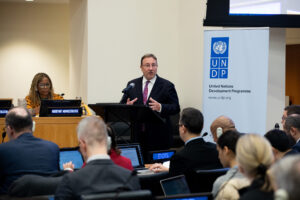Former Scale AI operations director Bilal Abu-Ghazaleh raised $9 million seed funding from CIV, General Catalyst, and Lux Capital for 1001 AI—a two-month-old startup building AI-native operating systems for physical operations across airports, ports, construction sites, and oil facilities in the Middle East and North Africa.
The round included participation from Chris Ré, Replit CEO Amjad Masad, DAMAC’s Amira Sajwani, RAED Ventures’ Khalid Bin Bader Al Saud, and Lean Technologies’ Hisham Al-Falih. Abu-Ghazaleh, who scaled Scale AI’s contributor network from operations associate to generative AI operations director before departing when Meta’s investment shifted company strategy, identified over $10 billion in operational inefficiencies across Gulf aviation, logistics, construction, and energy sectors.
The company targets first customer deployment by year-end in construction, with active discussions with major Gulf airports and construction firms. Abu-Ghazaleh plans to establish 1001 AI as the Gulf infrastructure orchestration standard before international expansion over five years.
Most AI startups target software workflows, document processing, or customer service automation. 1001 AI addresses physical operations: aircraft turnaround sequencing, cargo container routing, construction equipment allocation, and fuel truck dispatching.
Deena Shakir, partner at Lux Capital, framed the investment around operational complexity: “We’re extremely bullish on AI that solves physical-world problems at scale—optimizing how airports turn around flights, how ports move cargo, how construction sites operate. The MENA region offers significant potential with mission-critical infrastructure that’s under-digitized and ripe for transformation.”
The technical challenge differs from text-based AI. Physical operations require real-time data integration from IoT sensors, GPS trackers, scheduling systems, and workforce management platforms. Decision latency measured in minutes rather than milliseconds can cascade into flight delays, cargo backlogs, or construction schedule slippage.
Abu-Ghazaleh described the system as pulling data from existing client software, modeling operational workflows, and issuing automated directives: “Today, an operations manager might manually call someone to reroute a fuel truck or send a cleaning crew to another gate. With our system, that orchestration happens automatically.”
UAE and Saudi Arabia governments invest billions in AI infrastructure through entities like G42 (Abu Dhabi) and Saudi National Center for AI. This creates a procurement environment favoring AI adoption across state-backed infrastructure projects.
Abu-Ghazaleh cited nine out of ten regional mega-projects falling behind schedule or exceeding budgets. Saudi Arabia’s NEOM, UAE’s various smart city initiatives, and Qatar’s ongoing infrastructure development represent hundreds of billions in capital expenditure where efficiency gains translate to substantial cost savings.
The $10 billion inefficiency estimate across Gulf aviation, ports, construction, and oil/gas provides addressable market sizing. If 1001 AI captures 5-10% efficiency improvement monetized at 10-20% of savings generated, potential annual revenue could reach hundreds of millions across the region.
However, this assumes adoption by operators prioritizing efficiency over established vendor relationships and change management resistance common in infrastructure sectors.
Abu-Ghazaleh’s Scale AI tenure provides operational playbook and credibility. Scale achieved $1.4 billion valuation (now higher after Meta investment) building data labeling infrastructure for AI training. The company’s methodology—embedding teams with clients, running co-development sprints, tailoring systems to operational realities—transfers to 1001 AI’s approach.
Neeraj Arora, managing director at General Catalyst, emphasized execution credibility: “Bilal is building the decision engine to automate that complexity with Scale-proven execution and the regional gravity to make 1001 the platform this market builds on.”
The Scale AI connection also provides network effects. Abu-Ghazaleh’s experience scaling contributor networks and building government AI solutions (he was set to join Scale’s international public sector unit before departure) translates directly to 1001 AI’s target market.
Abu-Ghazaleh claims 1001 AI serves multiple industries because “operational flows across industries often look the same.” This horizontal platform thesis differs from vertical AI companies specializing in single industries.
The approach creates strategic tradeoffs. Horizontal platforms achieve economies of scale through shared infrastructure and cross-industry learning. However, they sacrifice deep domain expertise and customization depth that vertical solutions provide.
Aviation operations differ substantially from construction site management in regulatory requirements, safety protocols, and optimization objectives. Whether a single AI orchestration platform can effectively serve both without sacrificing performance remains unproven.
Successful horizontal infrastructure platforms (Stripe for payments, Twilio for communications) abstracted common functions across industries. 1001 AI must demonstrate that physical operations orchestration represents similarly generalizable capability rather than requiring industry-specific implementations.
Raising $9 million seed before product launch and customer deployments indicates investor conviction in founder credibility and market opportunity. The first customer deployment scheduled by year-end provides a near-term validation milestone.
The company operates two months post-founding with active discussions with Gulf airports and construction firms. This early customer engagement suggests Abu-Ghazaleh leveraged existing networks from Scale AI tenure and regional connections to accelerate sales cycles.
However, converting discussions to deployments requires product delivery, integration with legacy systems, and demonstrating ROI. Infrastructure operators exhibit conservative technology adoption patterns due to operational continuity requirements and safety considerations.
The $9 million will fund early deployments across aviation, logistics, and infrastructure while recruiting engineering, operations, and go-to-market roles across Dubai and London offices.
The Dubai-London split reflects operational realities: Dubai provides proximity to Gulf customers and government stakeholders, London offers access to European AI talent and serves as international headquarters for regulatory and corporate purposes.
Seed-stage funding typically supports 18-24 months of operations before Series A requirements. For infrastructure AI requiring custom deployments and extended sales cycles, capital efficiency depends on achieving multiple customer deployments demonstrating ROI before fundraising.
Physical operations AI includes companies like Palantir (enterprise data platforms), C3.ai (industrial IoT analytics), and sector-specific players like Assaia (airport operations) and FourKites (logistics visibility).
1001 AI’s differentiation centers on MENA market focus and horizontal platform approach. Established competitors prioritize developed markets with mature digital infrastructure. Targeting MENA’s under-digitized infrastructure creates first-mover advantages if 1001 AI establishes market position before global competitors enter.
However, under-digitization also creates integration challenges. Legacy systems in Gulf infrastructure may lack APIs or data standardization enabling seamless AI orchestration. Building connectors and middleware for each client could reduce scalability and increase deployment costs.
Investment Thesis Validation Requirements
For investors at seed stage, key metrics over next 12-18 months include:
Customer deployments: Converting discussions to paying contracts demonstrating product-market fit.
Efficiency metrics: Quantified improvement in operational KPIs (turnaround times, resource utilization, schedule adherence).
Cross-industry validation: Proving horizontal platform thesis by successfully deploying across aviation, construction, and logistics.
Revenue traction: Achieving annual recurring revenue justifying Series A at higher valuation.
Regional expansion: Extending beyond initial Gulf customers to broader MENA market.
The five-year plan to become Gulf’s infrastructure orchestration standard before international expansion provides an ambitious timeline. Success requires not only technical execution but also navigating government procurement, establishing regulatory compliance across jurisdictions, and competing against well-funded global infrastructure software vendors entering similar markets.








